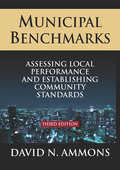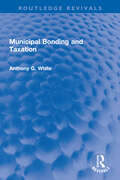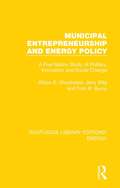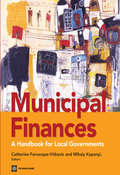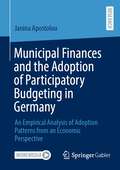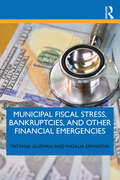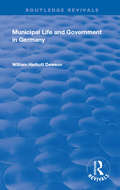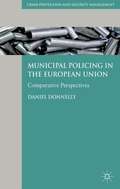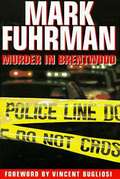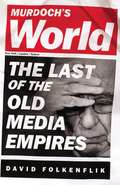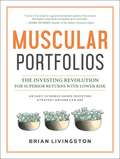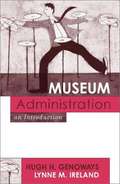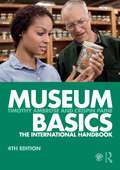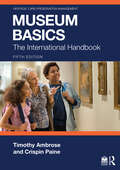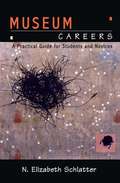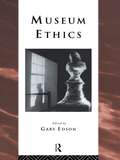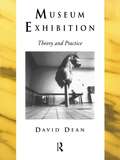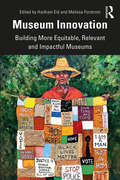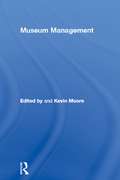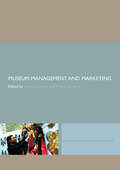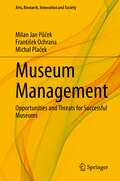- Table View
- List View
Mumias Sugar Company Limited: A Success Story
by Ray A. Goldberg Janet ShanerThe Mumias project in Kenya represents the best exchange of a private firm providing economic development leadership in a particular commodity project to examine the whole commodity system and the country.
Municipal Benchmarks: Assessing Local Performance and Establishing Community Standards
by David AmmonsCompletely updated with new listings and statistics throughout, this comprehensive resource goes beyond the current literature on local government performance measurement and provides benchmarks on more than 40 key topics against which performance can be assessed in all areas of operation. "Ammons has assembled a remarkable volume of benchmark data for a comprehensive range of municipal government services. Municipal Benchmarks will be of considerable help for municipalities in laying the groundwork for an accountable government." - Harry Hatry, The Urban Institute "I am delighted to see that ideas for advancing our industry are alive and thriving. Ammons's collection does an incredible service to every municipal manager in the country, and perhaps the world. These benchmarks clearly set standardized ways of looking at measuring the performance of municipal service delivery." - Ted Gaebler, City Manager, Rancho Cordoba, CA (co-author of Reinventing Government)
Municipal Bonding and Taxation (Routledge Revivals)
by Anthony G. WhiteThis book, first published in 1979, examines the economic lives of municipal governments. Local government provides a great deal of services, all of which must be paid for. The sources of these revenues are analysed here, in three sections: bonding and debt; taxation; and other, miscellaneous sources of revenue. The bibliographic entries stretch back into the nineteenth century, and see a large postwar increase as the financial problems of municipal corporations grew alongside the growth of the suburbs.
Municipal Entrepreneurship and Energy Policy: A Five Nation Study of Politics, Innovation and Social Change (Routledge Library Editions: Energy)
by Tom R. Burns Alison E. Woodward Jerry ElligOriginally published in 1994. The energy crisis of the 1970s provided an opportune climate for public sector entrepreneurship to develop. The authors present case studies from six innovative and diverse municipalities in Denmark, France, Germany, Sweden and the United States. The studies document problems these communities encountered while implementing new ideas in energy conservation and changes in energy supply and municipal planning. Each community was selected on the basis of its early, vigorous response to the energy crisis, and then followed up to examine roadblocks along the way to innovation in the public sector. The case studies highlight the challenges policy entrepreneurs face and the tactics they employ, revealing crucial differences between public and private sector entrepreneurship.
Municipal Finances
by Catherine D. Farvacque-Vitkovic Mihaly KopanyiThe Municipal Finance Handbook aims to help local government practitioners, particularly staff of medium and large cities, improve strategic management of municipal finances. The demands for pragmatic knowledge are fueled in part by decentralization and fiscal pressures, as transfer of responsibilities from central to local governments are not often accompanied with an adequate transfer of resources. Practitioners seek ideas and tools to control expenditures, strengthen revenues, as well as to tap large external funds, achieve creditworthiness, and adopt good borrowing practices. Advocating sound municipal management based on improved governance and enhanced accountability, this handbook provides a comprehensive picture of municipal finances with a broad scope. The eight chapters cover such topics as fiscal decentralization and intergovernmental finances; management of metropolises; instruments of good financial management; management of revenues, expenditures, assets, and external resources; and performance measurement. Focusing on the perspectives of local officers, this handbook combines theory, pragmatic how-to advice, best practices from global experiences, and possible solutions.
Municipal Finances and the Adoption of Participatory Budgeting in Germany: An Empirical Analysis of Adoption Patterns from an Economic Perspective
by Janina ApostolouParticipatory Budgeting (PB) is one of the most popular democratic innovations of recent times. Since its first implementation in Germany in 1998, a growing number of municipalities have experimented with it. Unlike in other countries, PB processes in Germany follow primarily the goal of increasing transparency, efficiency, and service-orientation as part of an effort to modernize public administration. In global comparison, the diffusion of PB in Germany has been rather slow. In this book, the author investigates the question how this specific adoption pattern occurs. For that purpose, she applies theories from Public Administration, Fiscal Federalism, Public Choice, and diffusion of innovations to explain the incentives driving politicians to adopt PB from a public finance point of view. According to empirical analysis by the author, municipalities with a relatively worse financial situation are more likely to adopt a PB process. Consequently, PB processes seem to be used as a tool to spread responsibility, gain legitimacy, and raise understanding by citizens for necessary budget cutting decisions.
Municipal Fiscal Stress, Bankruptcies, and Other Financial Emergencies
by Tatyana Guzman Natalia ErmasovaIt is difficult to find someone who has not heard about the Puerto Rico, Detroit, Michigan, or Orange County, California, bankruptcies. While guides for responsibly managing government finances exist, problems often originate not because of poor financial reporting or financial deficiencies but because issues external to financial wellbeing arise, such as economic, demographic, political, legal, or even environmental factors. Exacerbating the problem, there is not much advice in the existing literature on how to act when municipalities face financial struggles. Filling this important gap, this book explores fiscal health and fiscal hardships, municipal defaults and bankruptcies, and many other aspects to help guide local governments during fiscal distress. Fiscal hardships negatively affect the quality and availability of public goods and services and, consequently, the wellbeing of residents and businesses living and working in distressed municipalities. Turned off streetlights, unmaintained public parks, potholes, inconsistent garbage pickup, longer response time from emergency services, and multiple other issues that residents of the struggling municipalities deal with, lead to higher crime rates, lower quality of K-12 education, dangerous road conditions, lower housing values, outmigration of wealthier population, and numerous other problems. The COVID-19 pandemic put additional unprecedented pressure on municipal finances nationwide. In this book authors Tatyana Guzman and Natalia Ermasova evaluate distressed cities and municipalities and provide practical recommendations on improving their financial conditions. What are conditions and signs to look for to not to find yourself in similar situations? What can be done if your municipality is already experiencing fiscal hardships? What are the consequences of fiscal misfortunes? How does one exit a fiscal emergency? This book answers these and other questions and serves as a guide to fiscal health and prosperity for U.S. municipal governments, students and researchers in public finance, and general public management fields.
Municipal Life and Government in Germany (Routledge Revivals)
by William Harbutt DawsonFirst published in 1914, in various writings on German life and institutions, Dawson has touched upon isolated aspects of the subject of municipal government. The book, as its title explains, is concerned solely with questions of urban administration, yet without the limitation which the use of the word "municipal" might seem to suggest. The larger German cities and towns correspond for all practical purposes to the municipalities of the United Kingdom, as the smaller German towns correspond to the urban districts.
Municipal Policing in the European Union
by Daniel DonnellyThe book applies a model of municipal policing to compare a number of police systems in the European Union suggesting that in the future local communities will have some form of police enforcement mechanism that will not always include the sworn police officer.
Munoz Group Faces Brexit
by Forest Reinhardt Annelena LobbIn 2016, Muñoz Group, a multifaceted agribusiness company that developed, produced, packed, imported, and exported citrus, flowers, grapes, juice, and ice cream, faced an unexpected new challenge in the British public’s vote for the United Kingdom to exit the European Union. The outcome of the vote led to uncertainty around investment conditions, instability in the British pound, growth in anti-immigrant sentiment, and other changes. This created unusual business conditions for Muñoz Group’s CEO, Alvaro Muñoz, who had to decide how to adjust his strategy for the coming years, given that his company was headquartered in the United Kingdom—but did business all over the world.
Murder in Brentwood
by Mark FuhrmanPeople know Mark Fuhrman as the most pivotal witness of the O.J. Simpson trial. Now, readers can meet the real Mark Fuhrman, as he sets the record straight on the most infamous trial of the century. Includes 16 pages of never-before-published court documents and evidence photos.
Murdoch's World: The Last of the Old Media Empires
by David FolkenflikRupert Murdoch is the most significant media tycoon the English-speaking world has ever known. No one before him has trafficked in media influence across those nations so effectively, nor has anyone else so singularly redefined the culture of news and the rules of journalism. In a stretch spanning six decades, he built News Corp from a small paper in Adelaide, Australia into a multimedia empire capable of challenging national broadcasters, rolling governments, and swatting aside commercial rivals. Then, over two years, a series of scandals threatened to unravel his entire creation. MurdochOCOs defenders questioned how much he could have known about the bribery and phone hacking undertaken by his journalists in London. But to an exceptional degree, News Corp was an institution cast in the image of a single man. The companyOCOs culture was deeply rooted in an Australian buccaneering spirit, a brawling British populism, and an outsized American libertarian sensibility?at least when it suited MurdochOCOs interests. David Folkenflik, the media correspondent for NPR News, explains how the man behind BritainOCOs take-no-prisoners tabloids, who reinvigorated Roger Ailes by backing his vision for Fox News, who gave a new swagger to the "New York Post" and a new style to the "Wall Street Journal," survived the scandals?and the true cost of this survival. He summarily ended his marriage, alienated much of his family, and split his corporation asunder to protect the source of his vast wealth (on the one side), and the source of his identity (on the other). There were moments when the global news chief panicked. But as long as Rupert Murdoch remains the person at the top, "MurdochOCOs World" will be making news. "
Murphy's Law: New Fed Chairmen Always Seem to Face a Tough Environment
by Ethan S. HarrisIn a perfect example of Murphy's Law, Ben Bernanke stepped into the job of Fed chairman at just the wrong moment. Greenspan had let the economy, the housing market, and the credit market run too hot at the end of his tenure. This was bad news for Bernanke, but good news for someone trying to learn quickly about him. The challenging economic and market environment at the start of his term have provided a rich natural experiment for demonstrating how the new chairman will operate.
Muscular Portfolios: The Investing Revolution for Superior Returns with Lower Risk
by Brian LivingstonMuscular Portfolios is here to change the investing game — and help you leave stress behind with a stronger, smarter approach to investing. For decades, the financial services industry has sold risky investments, claiming that this was the only path to large gains. But this strategy is highly vulnerable to big losses that can devastate your portfolio. Today, there's a better approach. It combines the latest academic research in finance with the new ultra-low-cost index funds (exchange-traded funds). The result is an approach that provides market-like returns with dramatically smaller losses and requires only 15 minutes a month or less. Muscular Portfolios lays out the basic principles of this kind of investing so you can manage your own money successfully — without turning it into your second job. Investigative journalist Brian Livingston takes you behind the curtain of Wall Street and lays out a game-changing approach to investing: Muscular Portfolios, which are easy-to-use financial strategies you can set up yourself, even if you have no investment experience at all. Filled with helpful illustrations, compelling evidence, and simple, no-nonsense instructions, Muscular Portfolios is a resource, not a sales pitch. There are no financial products to buy, no secret formula to pay for. Everything is fully disclosed in bite-sized steps — and on a totally free website — that you can start using today to grow your wealth. Driven by cutting-edge investment research and backed by extensive market testing, Muscular Portfolios will revolutionize investing for families and individual investors.
Museum Administration: An Introduction (American Association for State and Local History book series)
by Hugh H. Genoways Lynne M. IrelandFrom this book, you can learn about everything from budgets and strategic planning to human resources and facilities management to collections and programming. Case studies and exercises throughout help you review and practice what you are learning.
Museum Basics: The International Handbook (Heritage: Care-Preservation-Management)
by Timothy Ambrose Crispin PaineThis fourth edition of Museum Basics has been produced for use in the many museums worldwide that operate with few professional staff and limited resources. The fourth edition has been fully updated to reflect the many changes that have taken place in museums around the world over the last six years. Drawing from a wide range of practical experience, the authors provide a basic guide to all aspects of museum work, from audience development and learning, through collections management and conservation, to museum management and forward planning. Museum Basics is organised on a modular basis, with over 100 units in eight sections. It can be used both as a reference work to assist day-to-day museum management, and as the key textbook for pre-service and in-service museum training programmes, where it can be supplemented by case studies, project work and group discussion. This edition includes over 100 diagrams to support the text, as well as a glossary, sources of information and support and a select bibliography. Museum Basics is also supported by its own companion website, which provides a wide range of additional resources for readers. Museum Basics aims to help the museum practitioner keep up to date with new thinking about the function of museums and their relationships with the communities they serve. The training materials provided within the book are also suitable for pre-service and in-service students who wish to gain a full understanding of work in a museum.
Museum Basics: The International Handbook (Heritage: Care-Preservation-Management)
by Timothy Ambrose Crispin PaineMuseum Basics provides an accessible and comprehensive introduction to professional practice in museums, galleries and related heritage organisations.This new edition includes a number of international case studies from a diverse group of guest authors who work in a variety of museums around the world. Ambrose, Paine and their contributing authors respond to recent developments in the museum field and incorporate content on new technology, as well as political and social issues, such as decolonisation, climate change and social justice. The book also covers different approaches to museology and current methods in core areas, such as collections, exhibitions, policy, education and management. Using the same modular structure as previous editions, the book includes 130 units. A number of new units have been added, including material about museums and conflict, museums and communities, loans, maintaining displays and exhibitions and sensitive objects and human remains. This edition is supported by refreshed diagrams, an updated glossary and its own Instructor and Student Resources, which provide a wide range of additional material for readers.Museum Basics will be essential reading for students engaged in the study of museums, heritage, public history, culture, archaeology, anthropology and tourism, who are learning to critically examine the ideas and ideals around museum culture. Staff and volunteers working in museums, galleries and other heritage and cultural institutions will be able to use the book to identify best practices for their daily work.
Museum Careers: A Practical Guide for Students and Novice
by N. Elizabeth SchlatterThis concise volume is the place to start for anyone considering a career in museums. Expert curator Elizabeth Schlatter outlines the nature of the profession, the types of museums, and the types of jobs within museums, including salary ranges. She tells the reader the kinds of training needed, how to secure a job, and how to move up the ladder once you are working in the filed. Schlatter discusses the pros and cons, rewards and challenges of embarking on a museum career. Interviews with a host of other museum professionals show the various pathways that people take within the field. For novices in the field, students in museum studies programs, or anyone considering this as a career choice, Schlatter's book is an essential starting point.
Museum Ethics: Theory and Practice
by Gary EdsonA number of developments in the museum movement during the last few years have forced museums to give greater attention to ethical issues. Members of a profession are increasingly regarded constituting an ethical community. Every person with such a community must have a sense of personal obligation as well as a responsibilty for others to assure ethical achievement. This volume firmly places notions of ethics in the field of action.Museum Ethics considers the theoretical and practical elements of the philosophy of conduct in relation to critical contemporaty issues and museums. This discussion encompasses the procurement of artifacts, the rights of indigenous peoples, repatriation, the politics of display, the conservation of objects and the role of education, as well as the day-to-day management of a museum. All persons active in museum matters, whether custodian, curator, or trustee have an ethical obligation to the museum profession and the public. This volume will allow the professional and student to work towards a more responsible and responsive museum community.
Museum Exhibition: Theory and Practice (Heritage: Care-Preservation-Management)
by David DeanMuseum Exhibition is the only textbook of its kind to consider exhibition development using both theory and practice in an integrated approach. This comprehensive study covers care of exhibits, writing accompanying text, using new technology, exhibition evaluation, administration and content for a wide range of collections. It provides a complete outline for all those concerned with providing displays in musuems and other cultural heritage contexts.
Museum Informatics: People, Information, and Technology in Museums (Routledge Studies in Library and Information Science #Vol. 2)
by Paul F. Marty Katherine Burton JonesMuseum Informatics explores the sociotechnical issues that arise when people, information, and technology interact in museums. It is designed specifically to address the many challenges faced by museums, museum professionals, and museum visitors in the information society. It examines not only applications of new technologies in museums, but how advances in information science and technology have changed the very nature of museums, both what it is to work in one, and what it is to visit one. To explore these issues, Museum Informatics offers a selection of contributed chapters, written by leading museum researchers and practitioners, each covering significant themes or concepts fundamental to the study of museum informatics and providing practical examples and detailed case studies useful for museum researchers and professionals. In this way, Museum Informatics offers a fresh perspective on the sociotechnical interactions that occur between people, information, and technology in museums, presented in a format accessible to multiple audiences, including researchers, students, museum professionals, and museum visitors.
Museum Innovation: Building More Equitable, Relevant and Impactful Museums
by Haitham EidMuseum Innovation encourages museums to critically reflect upon current practices and adopt new approaches to their civic responsibilities. Arguing that museums have a moral duty to perform, the book shows how social innovation can make them more equitable, relevant and impactful institutions. Including contributions from a diverse group of international scholars, practitioners and researchers, the book investigates the innovative approaches museums are taking to address contemporary social issues. The volume focuses on the concept of social innovation and individual chapters address a range of crucial issues, such as climate change; the COVID-19 pandemic; diversity and inclusion; the travel ban; and the repatriation of museum collections. Exploring the impact that organizational structures have on museums’ aspirations to act as agents for social change, the book also unpacks how museums can establish sustainable relationships with minority communities. Proposing steps that museums can take to affirm their relevance as viable community partners, the book breaks down silos and connects ideas across different areas of museum work. Museum Innovation explores the role of contemporary museums in society. It is essential reading for academics, students and practitioners working in the museum and heritage studies field. The book’s interdisciplinary nature makes it also an interesting read for those working in business studies, digital humanities, visual culture, arts administration and political science fields.
Museum Management (Leicester Readers in Museum Studies)
by Kevin MooreCollecting a selection of essential writings by some of the leading authors in the field, Kevin Moore examines the developments in, and effectiveness of, museum management in a world dominated by new and exciting heritage and leisure attractions. The selected papers in Museum Management outline the development of museum management to date, the challenges museums currently face, and the key areas of future development in management and marketing practice, and addresses: strategic management issues: policy formulation, corporate planning and performance measurement human resource management financial management the importance of marketing. This volume is an invaluable introduction to the key issues, controversies and debates in the subject. It will be essential reading for all students, museum managers and staff who need to keep up to date with latest developments in this field.
Museum Management and Marketing (Leicester Readers in Museum Studies)
by Richard Sandell Robert R. JanesDrawing together a selection of high quality, intellectually robust and stimulating articles on both theoretical and practice-based developments in the field, this Reader investigates the closely linked areas of management and marketing in the museum. The articles, from established and world-renowned contributors, practitioners and writers at the leading edge of their fields, deal with the museum context of management and how marketing and management practices must take account of the specifics of the museum and the not-for-profit ethos. Key writings from broader literature are included, and the collection of key writings on the investigation and study of management and marketing in the museum are of great benefit not only to those studying the subject, but also to professionals working and developing within the field.
Museum Management: Opportunities and Threats for Successful Museums (Arts, Research, Innovation and Society)
by Michal Plaček František Ochrana Milan Jan PůčekThis book centers on museum management with particular focus on risk management. It sees the museum as a modern institution that, in addition to its classical heritage function (collections management), also provides an educational function and implements this education through experience (the experiential function of the museum). It represents a combination of academic excellence and experience from real managers from museums and other public institutions. Additional topics such as strategic and operational museum management and museum research management are discussed and case studies from daily management practice are included.

